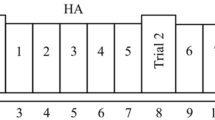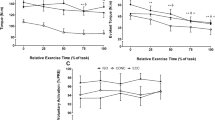Abstract
The aim of the study was to investigate the relationship between local tissue temperature, peak torque and time to fatigue during isometric knee extensions. Nine males performed maximum voluntary contractions (MVCs) and isometric knee extensions at 70% MVC to exhaustion after 30 min of hot [H, 47.7 (1.3)°C; mean (SD)], warm [W, 34.6 (0.4)°C], temperate [T, 24.5 (1.3)°C], and cold [C, −11.9 (1.8)°C] localized temperature applications. Isometric peak torque was not significantly affected by temperature. Time to fatigue was strongly and negatively correlated (r=−0.98) to temperature, with endurance after H [46.99 (4.98) s] and W [54.36 (9.18) s] significantly shorter than after C [73.27 (13.43) s]. We conclude that local tissue temperature does not impair peak force production but may change muscular endurance through local factors.





Similar content being viewed by others
References
Asmussen EF, Bonde-Peterson Jorgensen K (1976) Mechano-elastic properties of human muscles at different temperatures. Acta Physiol Scand 96:83–93
Ball D, Burrows C, Sargeant AJ (1999) Human power output during repeated sprint cycle exercise: the influence of thermal stress. Eur J Appl Physiol 79:360–366
Bell DG (1993) The influence of air temperature on the EMG/force relationship of the quadriceps. Eur J Appl Physiol 67:256–260
Bergh U, Ekblom B (1979) Influence of muscle temperature on maximal muscle strength and power output in human skeletal muscles. Acta Physiol Scand 107:33–37
Binkhorst RA, Hoofd L, Vissers AC (1977) Temperature and force-velocity relationship of human muscles. J Appl Physiol 42:471–475
Cornwall MW (1994) Effect of temperature on muscle force and rate of muscle force production in men and women. J Occup Sports Phys Therapy 20:74–80
Davies CT, Young K (1983) Effect of temperature on the contractile properties and muscle power of triceps surae in humans. J Appl Physiol 55:191–195
Davies CT, Mecrow IK, White MJ (1982) Contractile properties of the human triceps surae with some observations on the effects of temperature and exercise. Eur J Appl Physiol 49:255–269
Edwards RHT, Harris RC, Hultman E, Kaijser L, Koh D, Nordesjo L-O (1972) Effect of temperature on muscle energy metabolism and endurance during successive isometric contractions, sustained to fatigue, of the quadriceps muscle in man. J Physiol (Lond) 220:335–352
Enoka RM, Stuart DA (1992) Neurobiology of muscle fatigue. J Appl Physiol 72:1631–1648
Enwemeka CS, Allen C, Avila P, Bina J, Konrade J, Munns S (2002) Soft tissue thermodynamics before, during, and after cold pack therapy. Med Sci Sports Exerc 34:45–50
Falk B, Radom-Isaac S, Hoffmann JR, Wang Y, Yarom Y, Magazanik A, Weinstein Y (1998) The effect of heat exposure on performance of and recovery from high- intensity, intermittent exercise. Int J Sports Med 19:1–6
Ferretti G, Ishii M, Moia C, Cerretelli P (1992) Effects of temperature on the maximal instantaneous muscle power of humans. Eur J Appl Physiol 64:112–116
Galloway SD, Maughan RJ (1997) Effects of ambient temperature on the capacity to perform prolonged cycle exercise in man. Med Sci Sports Exerc 29:1240–1249
Hagg G, Kadefors R (1996) EMG alterations at sustained contractions with special emphasis on applications in ergonomics. In: Kumar S, Mital A (eds) Electromyography in ergonomics. Taylor & Francis, London, pp 171–172
Holewijn M, Heus R (1992) Effects of temperature on electromyogram and muscle function. Eur J Appl Physiol 65:541–545
King PG, Mendryk S, Reid DC, Kelly R (1970) Effect of actively increased muscle temperature on grip strength. Med Sci Sports 172–175
Kozlowski S, Brzezinska Z, Kruk B, Kaciuba-Uscilko H, Greenleaf JE, Nazar K (1985) Exercise hyperthermia as a factor limiting physical performance: temperature effect on muscle metabolism. J Appl Physiol 59:766–773
Nybo L, Nielsen B (2001a) Hyperthermia and central fatigue during prolonged exercise in humans. J Appl Physiol 91:1055–1060
Nybo L, Nielsen B (2001b) Perceived exertion is associated with an altered brain activity during exercise with progressive hyperthermia. J Appl Physiol 91:2017–2023
Petrofsky JS, Lind AR (1980) The influence of temperature on the amplitude and frequency components of the EMG during brief and sustained isometric contractions. Eur J Appl Physiol 44:189–200
Ranatunga KW, Sharpe B (1987) Contractions of a human skeletal muscle at different temperatures. J Physiol (Lond) 390:383–395
Sargeant AJ (1987) Effect of muscle temperature on leg extension force and short-term power output in humans. Eur J Appl Physiol 56:693–698
Segal SS, Faulkner JA, White TP (1986) Skeletal muscle fatigue in vitro is temperature dependent. J Appl Physiol 61:660–665
Stanley DC, Kraemer WJ, Howard RJ Jr, Armstrong LE, Maresh CM (1994) The effects of hot water immersion on muscle strength. J Strength Cond Res 8:134–138
Westerblad H, Allen DG, Bruton JD (1998) Mechanisms underlying the reduction of isometric force in skeletal muscle fatigue. Acta Physiol Scand 162:253–260
Author information
Authors and Affiliations
Corresponding author
Rights and permissions
About this article
Cite this article
Thornley, L.J., Maxwell, N.S. & Cheung, S.S. Local tissue temperature effects on peak torque and muscular endurance during isometric knee extension. Eur J Appl Physiol 90, 588–594 (2003). https://doi.org/10.1007/s00421-003-0927-y
Accepted:
Published:
Issue Date:
DOI: https://doi.org/10.1007/s00421-003-0927-y




